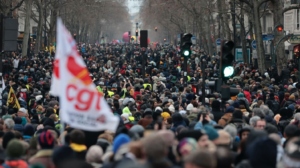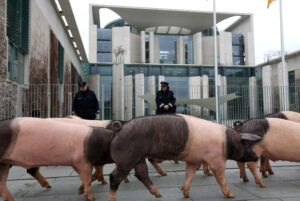FARMERS’ PROTESTS REMAIN HOT IN EUROPE

Nationwide French farmer protests

SPAIN FARMERS AND STOCKMEN HAVE BIG ACTIONS FOR TUESDAY, Feb. 7. This weekend, Greek farmers staged major demonstrations. There are actions from Ireland to Poland. The common focus: farmers cannot continue to operate at a loss. The economy is in breakdown in Europe. Those in high office now are immoral and incompetent.
BRUSSELS EU HEADS OF STATE MEETING. Thursday Feb. 1, was the heads of state meeting of all 27 member nations of the European Union in Brussels. There was a siege of 1400 tractors, and thousands of demonstrators outside the Summit hall. Agriculture was, for sure, put on the agenda, which otherwise had been pre-scheduled to be only continued funding for Ukraine. What happened is that a few concessions were made to farmers, and otherwise the EU voted up $54 bil to go to Ukraine in military and economic support (over four years). So it was “tanks, not tractors.”
DEMONSTRATIONS will continue. Farm leaders of the Europe-wide mass demonstrations pledged they would continue their protests after the European Commission ( that runs the EU policy) offered only very limited responses to farmers’ demands. By Feb. 3, certain protest barricades had been removed from French and Belgian highways; but many farm leaders issued warnings that fundamental questions remain. Arnaud Rousseau, head of FNSEA, France’s largest farm association (Fédération nationale des syndicats d’exploitants agricoles), issued an ultimatum. He told media that new government farming remedies must be implemented by Feb. 24, the start of France’s huge trade fair, Salon de l’Agriculture, and new laws passed by June, or else.
BRUSSELS WAS UNDER SIEGE. Outside the EU Summit’s meeting hall, some 1,400 tractors, and a huge crowd kept watch, with banners and bonfires. At the same time, demonstrators blocked highways into Brussels, and staged shutdowns at access points along the main motorways all across Europe, with tractors and trucks, barriers of hay bales, dumps of imported food, and manure piles. Demonstrators are targeting the agro-food cartel sites—Carrefour supermarket warehouses, Danone, McDonalds, and other trans-nationals that underpay and over-exploit, protected by the EU, and national governments.
POPULATION SUPPORTS THE FARMERS. Standing with the farmers are demonstrators from all economic sectors—fishermen, truckers, railway and dock workers, teachers, health care workers, skilled tradesmen, retail workers, and people from all kinds and sizes of business, construction, and other occupations. Farmers and allies are in the streets from Poland and Greece, to Ireland and Spain.
GERMAN TRABSPORTATION WORKERS PROTEST. The once-advanced rail and autobahn system is in serious decline, for lack of maintenane, modernization, and crazy green measures. The same day as the farmers surrounded the Brussels Summit, 15,000 striking German workers shut down 11 major airports in Germany. After a six-day rail strike ended Jan. 29 in Germany, the longest in recent history, 90,000 transit workers went on strike Feb. 3 on buses and light rail in 15 out of 16 states. Port workers are conducting occasional shut-downs from Hamburg in Germany to Zeebrugge in Belgium.
DEMAND FOR ECONOMY-BUILDING MEASURES. The demands differ from sector to sector and nation to nation, but taken all together, they call for government measures—emergency and long term, to restore functioning national economies. This means in all sectors, from energy and infrastructure, to health care and education. The fact that farmers can no longer produce food is the clear call to action for everyone.
The present impossible conditions for farming in the EU include: high prices for energy and other inputs; lack of infrastructure for water supplies; lack of defenses against floods and droughts; Green Deal “Farm-to-Fork” restrictions on land use, livestock numbers, and agro-chemicals, plus crazed “biodiversity” and “anti-emission” rules; and overall income so low, farm families cannot survive. At the same time, EU and national governments support the agro-cartels, and the green finance complex, including imports of food commodities from Ukraine.
EU MAKES LIMITED CONCESSIONS. The EU Summit scrambled to offer a semblance of concessions, including approval to France for giving a year’s delay on the EU order that farmers must not produce anything on 4% of their farmland. The EU offered to cushion any bad effects on imports of (cartel) poultry, grain, and sugar coming into the EU from Ukraine, but said, the imports will continue. The EU promised that any trade deal with South America—the Mercosur deal, for example—will dis-allow dumping of beef and other American food onto EU markets. In other words, the European Commission said, “trust us.”
Not only does no one trust the EU’s European Commission, but its President, Ursula von der Leyen is a focus of ridicule, and for removal. The European Parliament elections are June 6-9. Oblivious to the anger against her, von der Leyen held a meeting Jan. 25 on the “Strategic Dialogue on the Future of EU Agriculture,” which included participation by representatives of the food cartels and the World Wildlife Fund.
A banner popular in the German farmers’ Jan. 8-15 Week of Action was: “They Don’t Sow, They Don’t Reap, But They Think They Know Better.” And, demonstrators outside the EU Summit Feb. 2 had signs proclaiming, “Ursula, We Are Here.” The EU leaders voted Feb. 1 to send $54 billion (over four years) in military and economic funds from the EU to Ukraine. The message: tanks not tractors.
Economic Program Proposals
HERE IS A STATEMENT CIRCULATING as of Feb. 5 from the east Germany branch of the LsV–Land schafft Verbindung (Countryside Makes Connections)–the main co-organizer of the German demonstrations, in rough translation:
Politicians Should Not Fuss with Subsidies, We Need To:
CLEAR THE WAY FOR A STRONG DOMESTIC AGRICULTURE
The tax increase on agricultural diesel cannot be left as it is and must not be compensated for by a new subsidy such as the farmers’ solidarity tax, says Werner Koslowski. The 59-year-old dairy farmer from Wohnste in Lower Saxony is therefore setting off on his tractor to campaign for more added value. We want to pay taxes – income taxes! To do this, we have to earn a reasonable income again with our work on our farms. Politicians should not subsidize us, but clear the way for strong domestic agriculture. That is why we demand:
1. effectively prohibit unfair trading practices, in particular the purchase of food below production costs
2. introduction of country of origin labeling as information for all citizens, mandatory on all foodstuffs in retail and food service outlets
3. mandatory contracts for milk and cattle deliveries – with no exception for cooperatives – end price dictates, force dairies and slaughterhouses to agree on specific quantities and prices in advance
4. unbundling of monopolies in the food industry and food retail: swift adoption of antitrust law reform, parallel sector investigations, unbundling orders against at least Edeka, Aldi, Lidl, Rewe, DMK, Tönnies by 2024
5. break off negotiations with Mercosur and Chile; only conclude free trade agreements including agricultural products with countries that produce to the same social and environmental standards
6. expiry of duty-free status for Ukrainian agricultural products by June 2024, with immediate effect only transit permitted in sealed containers for shipment outside the EU
7. simplified revision of the production requirements for fertilization, plant protection and livestock farming in accordance with good agricultural practice
8. effective reduction of bureaucracy through de minimis limits in administrative enforcement, below which record-keeping obligations and routine checks are no longer required
9. a ban on genetic engineering and laboratory meat and all patented processes that corporations use to control production
10. allow wolves to be shot at pasture fences with legal certainty, adapt nature conservation law and incorporate it into hunting law
Our demands do not cost any tax money, they relieve the state, strengthen regional value creation and entrepreneurial responsibility – and need broad political support.